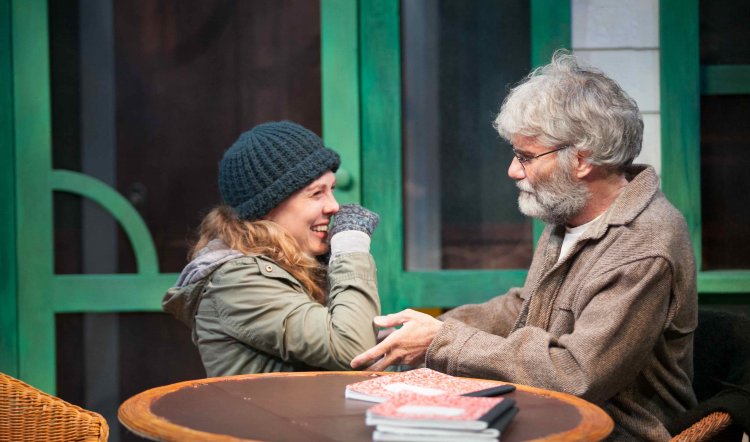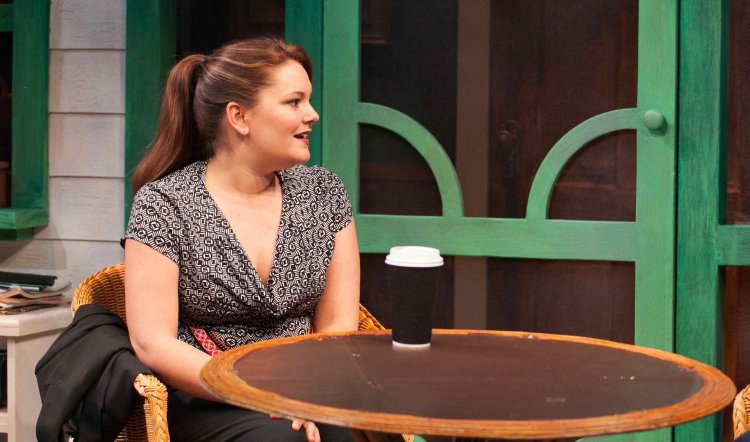
PROOF
PROOF, Ensemble Theatre, 6 February-8 March 2014. Photography by Clare Hawley: Matilda Ridgway and Michael Ross (above) and Catherine McGraffin (right).
According to The New York Times review of the original 2001 Broadway production, Proof is "As accessible and compelling as a detective story…has the pace of a psychological thriller." This quote is being used by the Ensemble crew to sell their 2014 version of the play and it remains true enough to repeat and even embellish.
As directed by Sandra Bates with the quartet of Matilda Ridgway, Michael Ross, Catherine McGraffin and Adriano Cappelletta, Proof is as tense and compelling as a detective story and has the pace and appeal of a psychological thriller. And just when the tension is becoming unbearable - there is laughter. This new production reveals a cunningly written and constructed play of simmering family and personal resentment, frustration, hope and ultimately: love...
The story is as simple and complex as a mathematical problem. World-famous mathematician Robert (Ross) and his daughter Catherine (Ridgway) are sitting, one September night, on the back stoop of their aged house on the edge of the University of Chicago campus. It is just past midnight and to her surprise, he has remembered it's her 25th birthday - there is a bottle of "champagne", domestic, from Minnesota. It's disgusting but she swigs on the bottle anyway, thrilled to be talking to her dad and to have him in such an expansive mood.
Upstairs meanwhile is Hal (Cappelletta), one of Robert's one-time PhD students. He's going through the 100+ notebooks in Robert's study, written during the previous eight years of the maths genius's mental disintegration. He is hoping against hope to find more of the genius and less of the gibberish that apparently closely fills the pages.
Within this opening scene it is revealed that Robert has just died - his funeral is the next day - and Claire (McGraffin), his eldest daughter is arriving from New York City. The two girls have little in common, Catherine is a math geek and left university to look after her father when he became ill; Claire fled to New York and a high-flying finance job and assuaged her conscience by sending money. Catherine wears multi-patterned socks and daggy trackies, Claire is a power suit kind of woman (costumes by Graham Maclean who has also designed a comfy, ratty old clapboard row house into the Ensemble for this play).
Proof won the 2001 Pulitzer, the Tony and the New York Drama Critics Circle awards for best play and as it unfolds under the taut direction of Bates and assistant director Jo-Anne Cahill it's easy to see why. David Auburn writes with deceptive facility and has created four characters and a "will he - won't he? Did she - didn't she? Will they - won't they?" series of problems that gradually ratchet up the tension in flashbacks and the present day.

Through it all Matilda Ridgway maintains a laconically amused ennui that barely disguises her deep anxiety and sorrow. She is gifted most of the laughs and is as dry as a stick in a drought in delivering them. Hers is a taut and muscular performance and one which suggests that coming off three months of Shakespeare (in Sport for Jove's Much Ado About Nothing) is the best possible exercise for a young actor.
As Robert, Michael Ross makes a marvellously alive dead man in his whimsical approach to madness and maths. It's a tender performance and the chemistry with Ridgway is touching. Catherine McGraffin has a harder row to hoe as the daughter who will solve all problems whether you want them solved or not. She loved her father, but couldn't cope with his descent, she loves her sister and is determined to save her from that fate, even if she has to drive her crazy to do it. You could slap her but can also see where she's coming from - including the fear that underlies her bossiness.
Adriano Cappelletta is the one who perhaps has most to win and lose, including respect, love and a career. As Hal, he is at the point of facing up to the truth that he will never be great and may only be average if he's really lucky and puts his mind to it. He's at once goofy and attractive, honest and untrustworthy; conniving and guileless - another lovely performance.
The result is two hours of uncommonly riveting entertainment that don't depend on any knowledge of mathematics - but you'll probably feel a little cleverer afterwards and suspect that something about prime numbers and proofs has seeped in. See it.



